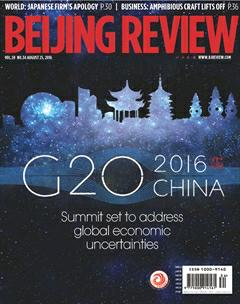UNIVERSAL OUTREACH
2016-09-13EconomicgrowthanddevelopmentmustembraceinclusivityinmultipolarworldByCliffordKiracofe
Economic growth and development must embrace inclusivity in a multipolar world By Clifford A. Kiracofe
UNIVERSAL OUTREACH
Economic growth and development must embrace inclusivity in a multipolar world By Clifford A. Kiracofe
The author is an educator and former senior professional staff member of the U.S. Senate Foreign Relations Committee

Will the upcoming G20 Summit mark a constructive new direction for the international community? Clearly, the global situation today is in dire straits, and many see failed Western leadership and policies as responsible.
Many hope the G20 will play the leading role in fostering a new era of global growth and development. The crumbling post-World War II international fnancial and political architecture,spreading international terrorism, and deepening social turmoil and poverty call for real change and new, constructive vision.
Repeating history?
Almost three decades after the end of the Cold War, international tensions are increasing, and the global economy is threatened by a lack of fnancial stability and productive economic development.
Critics say that the West has run out of ideas and solutions. Not only is Washington and the NATO alliance stuck in a Cold War mode,but they seem to be moving nostalgically backwards to an updated version of 19th-century imperialism.
The foreign policy establishment in the United States is now sharply challenged by Donald Trump, the blunt and bombastic Republican Party presidential candidate. The challenge resonates with the American people,who reject further unnecessary interventionism and seemingly endless wars.
But the transatlantic elite in the United States, Canada, and Europe pursues a neoimperial vision. For over a decade, this dominant elite has followed a geopolitical vision which takes note of the rise of China and the reemergence of Russia and seeks to build an Atlantic fortress. The intention is to tighten Western political,economic, and military ties so as to maintain global dominance.
The vision regards the Atlantic stronghold as the “center” of power onto which the global“periphery” is linked and by which it is dominated. Critics say this resembles the plantation systems of centuries past imposed on non-Europeans in Africa, the Middle East, and Asia.
New international direction
Today, in the context of the new industrial revolution, lessons from the past must be recalled lest yet another round of neoimperialism be unleashed in the world. It should not be forgotten that the second industrial revolution of the late 19th century caused a new wave of European imperialism particularly in Africa.
Aside from military power, critics say the central mechanism of such systems is fnance capitalism, which undergoes various crises over time because it is unsustainable. In recent years,Western banks and fnancial markets owing to rampant speculation and corrupt manipulation,triggered the crisis of 2007-08. Lack of effective national and international regulatory action facilitated the meltdown.

The fnancial crisis illustrated the consequences of permitting fnance capitalism to dominate national and international policymaking and to preclude effective regulation in the interests of stability and economic growth.
The emphasis of the upcoming G20 Summit on economic growth and development is welcome and must lead to a new international direction. If not, the world will face ever sharper contradictions in the global economy.
The fundamental contradiction is between finance capitalism on the one hand and the productive forces of a modern industrial econ-omy on the other hand. Certainly, fnance must serve industry, and not the reverse, as a basic principle of the real economy.
Regulating ‘casino' capitalism
The G20 process grapples with many pressing issues on the financial side. It is to be hoped that concrete and effective measures and policies will result. Serious national and international regulation of present-day speculative “casino”capitalism is long overdue.
In fact, critics say that the fnancial situation in Europe and the United States is worse than just before the 2007-08 crisis. No significant steps have been taken to separate speculative investment banking from commercial banking. Thus, the world is more vulnerable today to another severe crisis, they say.
The G20's focus on development means focus on the real economy, which some call the physical economy. This stands in contrast to the virtual economy of speculative “casino capitalism.” This means a focus on the productive forces in industry and agriculture.
It is essential to foster growth and development investment in productive forces. The present G20 emphasis on investment and sustainable growth is welcome. It comes none too soon, given the challenges of the present international economic situation and the socioeconomic challenges faced by many countries in today's rapidly changing world.
Infrastructure is central to economic development. From its very beginning in the United Kingdom, the industrial revolution advanced owing to continual development and modernization of infrastructure. The dense railroad infrastructure in the UK was a primary factor.
The lesson was not lost when the British went on to modernize the transportation infrastructure of India by building a massive railway system as a key factor of integration and economic development.
The United States would never have developed into a modern industrial country without the systematic development of infrastructure which followed the British and French examples. First came river and seaports, then canals, and fnally railroads.
The transcontinental railroad developed under President Abraham Lincoln symbolized the unity of the nation but also the integration of the national economy. Although the United States once had the leading railroad system in the world, it has declined greatly and now requires redevelopment.
In today's world, modern seaports and airports join railroads as being fundamental to the real economy of productive forces. To its credit, the G20 is addressing such issues and no doubt will spur a modern vision for global development benefiting developed as well as developing countries.

(left) 28-year-old Kadee Ingram sits with her son outside a tent where she lives in Seattle, while trying to fnd work on October 13, 2015Japanese and U.S. offcials hold a joint defense meeting in Tokyo on July 5 in an effort to strengthen their military alliance
No country forgotten
The G20 2016 process aims at fostering inclusivity. This is essential as the world becomes more multipolar and polycentric. No country should be forgotten or left out of the process of sustainable global development.
China wisely invited representative developing countries to the G20 Summit. All voices of the international community should be heard,and these representatives can bring a much needed message and vision. Toleration of cultural and political differences and of development models responsive to local characteristics and values is essential to the international community. Such toleration can foster a sense of unity within diversity.
China has advanced a historic proposal in the Belt and Road Initiative, which is forwardlooking and inclusive. It brings mutual beneft to participants, not to mention a certain sense of community, as did once the ancient Silk Road.
The United States has failed in its foreign policy under presidents George W. Bush and Barack Obama. Washington has failed to promote peace and development. Rather, it has promoted endless war and destruction.
It is time for new ideas and new leadership in world affairs. The universal values of equality,mutual respect, and mutual benefit must be restored within the international community.
The G20 mechanism may well be a key to a better future for mankind. In a sense, the hopes of the world focus on the upcoming summit hosted by China in the ancient city of Hangzhou. The Grand Canal of many centuries ago is an enduring symbol of the central role of infrastructure in national development. Perhaps that ancient symbol can inspire a new direction for mankind today. ■
